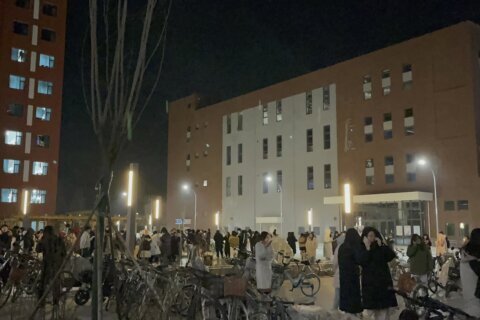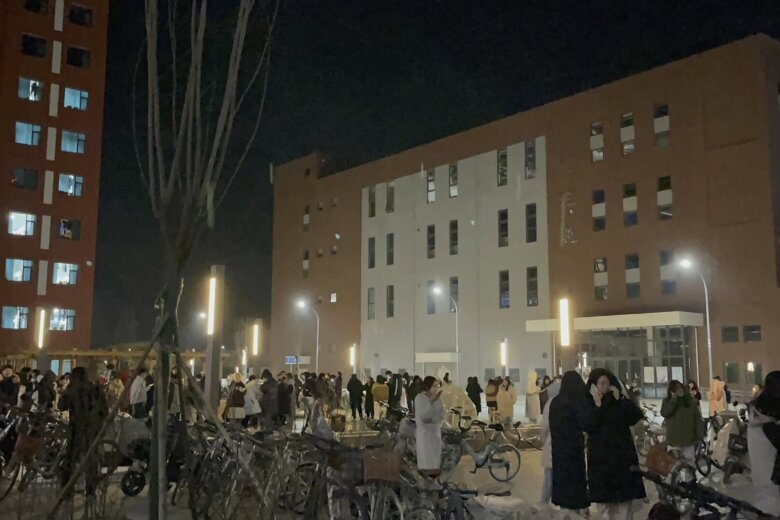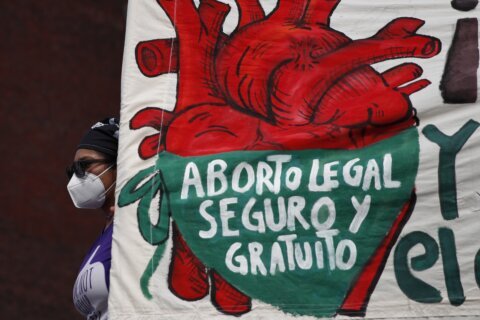
BEIJING (AP) — A strong overnight earthquake rattled a mountainous region of northwestern China, authorities said Tuesday, reducing homes to rubble, leaving residents outside in a below-freezing winter night and killing 131 people in the nation’s deadliest quake in nine years.
The magnitude 6.2 earthquake struck just before midnight on Monday, injuring more than 700 people, damaging roads and knocking out power and communication lines in Gansu and Qinghai provinces, officials and Chinese media reports said.
As emergency workers searched for the missing in collapsed buildings and at least one landslide, people who lost their homes spent a cold winter night in tents at hastily erected evacuation sites.
“I just feel anxious, what other feelings could there be?” said Ma Dongdong, who noted in a phone interview that three bedrooms in his house had been destroyed and a part of his milk tea shop was cracked wide open.
Afraid to return home because of aftershocks, he spent the first night in a field with his wife, two children and some neighbors, where they made a fire to stay warm. In the early morning, they went to a tent settlement that Ma said was housing about 700 people. As of mid-afternoon, they were waiting for blankets and warm clothing to arrive.
The earthquake struck at a relatively shallow depth of 10 kilometers (6 miles) in Gansu’s Jishishan county, about 5 kilometers (3 miles) from the provincial boundary with Qinghai, the China Earthquake Networks Center said. The U.S. Geological Survey measured the magnitude at 5.9.
State broadcaster CCTV said 113 were confirmed dead in Gansu and another 536 injured in the province. Eighteen others were killed and 198 injured in Qinghai, in an area north of the epicenter, CCTV said in an update early Wednesday.
There were nine aftershocks measuring magnitude 3.0 or higher by 10 a.m. — about 10 hours after the initial earthquake — the largest one registering a magnitude of 4.1, officials said.
Emergency authorities in Gansu issued an appeal for 300 additional workers for search and rescue operations, and Qinghai officials reported 16 people missing in a landslide, down from 20 earlier, according to Chinese state-owned media.
The earthquake was felt in much of the surrounding area, including Lanzhou, the Gansu provincial capital, about 100 kilometers (60 miles) northeast of the epicenter. Photos and videos posted by a student at Lanzhou University showed students hastily leaving a dormitory building and standing outside with long down jackets over their pajamas.
“The earthquake was too intense,” said Wang Xi, the student who posted the images. “My legs went weak, especially when we ran downstairs from the dormitory.”
The death toll was the highest since an August 2014 quake that killed 617 people in southwest China’s Yunnan province. The country’s deadliest earthquake in recent years was a 7.9 magnitude quake in 2008 that left nearly 90,000 dead or presumed dead and devastated towns and schools in Sichuan province, leading to a yearslong effort to rebuild with more resistant materials.
Li Haibing, an expert at the Chinese Academy of Geological Sciences, said that the relatively high number of casualties in the latest quake was in part because it was shallow. “Therefore, it has caused greater shaking and destruction, even though the magnitude was not large,” he said.
Other factors include the quake’s mainly vertical movement, which causes more violent shaking; the lower quality of buildings in what is a relatively poor area, and the fact that it happened in the middle of the night when most people were home, Li said.
The epicenter was about 1,300 kilometers (800 miles) southwest of Beijing, the Chinese capital. The remote and mountainous area is home to several predominantly Muslim ethnic groups and near some Tibetan communities. Geographically, it is in the center of China, though the area is commonly referred to as the northwest, as it is at the northwestern edge of China’s more populated plains.
Tents, folding beds and quilts were being sent to the disaster area, state broadcaster CCTV said. It quoted Chinese leader Xi Jinping as calling for an all-out search and rescue effort to minimize the casualties.
The overnight low in the area was minus 15 to minus 9 degrees Celsius (5 to 16 degrees Fahrenheit), the China Meteorological Administration said. The Beijing Youth Daily, a Communist Party newspaper, quoted an unnamed rescue coordinator saying there was a need for generators, long coats and fuel for stoves, among other items. The coordinator recommended sending halal food because of the ethnic makeup of the affected population.
At least 4,000 firefighters, soldiers and police officers were dispatched in the rescue effort, and the People’s Liberation Army Western Theatre set up a command post to direct its work.
A video posted by the Ministry of Emergency Management showed emergency workers in orange uniforms using rods to try to move heavy pieces of what looked like concrete debris at night. Other nighttime videos distributed by state media showed workers lifting out a victim and helping a slightly stumbling person to walk in an area covered with light snow.
Two residents of Jishishan county told The Associated Press that there were cracks in their walls but that their buildings did not collapse. They were unsure whether it was safe to stay in their homes and figuring out where to spend the night.
Middle school student Ma Shijun ran out of his dormitory barefoot without even putting on a coat, according to a Xinhua report. It said the strong tremors left his hands a bit numb, and that teachers quickly organized the students on the playground.
Earthquakes are somewhat common in the mountainous area of western China that rises up to form the eastern edge of the Tibetan Plateau.
In September 2022, 93 people were killed in a 6.8 magnitude earthquake that shook China’s southwestern province of Sichuan, triggering landslides and shaking buildings in the provincial capital of Chengdu, where 21 million residents were under a COVID-19 lockdown.
___
Associated Press researchers Wanqing Chen and Yu Bing contributed to this report.
—-
This story has been corrected to say the earthquake was the deadliest in China in nine years.
Copyright © 2024 The Associated Press. All rights reserved. This material may not be published, broadcast, written or redistributed.







